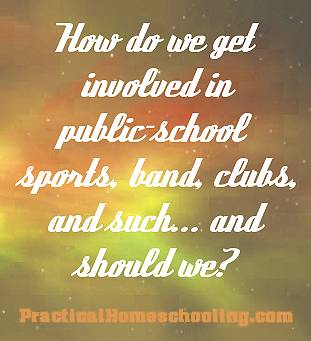Can Homeschoolers Participate In Public School Programs?
By Chris Klicka
Printed in Practical Homeschooling #33, 2000.
 How do we get involved in public-school sports, band, etc... and should we?
How do we get involved in public-school sports, band, etc... and should we?

|
 |
 Homeschoolers have come a long way. For almost 15 years, homeschoolers struggled to be free from the stifling control of the public schools. We at the Home School Legal Defense Association waged many of those battles in the courts, legislatures, school board hearings, and sometimes at the front door of the homeschool family. By God's grace, it is now legal to homeschool in all 50 states with minimal requirements.
Homeschoolers have come a long way. For almost 15 years, homeschoolers struggled to be free from the stifling control of the public schools. We at the Home School Legal Defense Association waged many of those battles in the courts, legislatures, school board hearings, and sometimes at the front door of the homeschool family. By God's grace, it is now legal to homeschool in all 50 states with minimal requirements.
As homeschoolers become more comfortable with their freedom, some are wondering if they can keep homeschooling and also participate in certain public school programs. Some of these programs include public school sports teams, band, clubs, and academic classes. The short answer is: "It depends."
You are probably thinking, "This is the kind of answer I expect from a lawyer!"
The reason the answer is vague is because there is no fundamental right for any child to have access to the public schools in the U.S. Constitution or any state constitution. Equal access for homeschoolers to the public schools is a state-granted privilege, not a right. This means the state can give equal access to a homeschooler or take it away. The state or local public school determines the rules by which you must abide or have your privilege to participate in the public school service withdrawn.
This differs from parents' fundamental right to choose to educate their own children at home. This is a right guaranteed by the First and Fourteenth Amendments of the U.S. Constitution. The right to homeschool is not a state-granted privilege.
Each state has a different approach to the equal access issue. In ten states, homeschoolers can participate in public school programs, since the state has enacted a specific law giving them a statutory right to do so. In the remaining states, the decision to allow equal access is left to the individual school districts or interscholastic athletic agencies.
Equal Access States
Ten states currently force public schools to allow homeschoolers access to classes or sports part-time. These states are Arizona, Colorado, Florida, Idaho, Iowa, Maine, North Dakota, Oregon, Utah, and Washington. All of these states, except Utah, have passed equal access laws. Utah requires access through State Office of Education regulations rather than by statute. In both Arizona and Oregon, the law only requires school districts to allow access to homeschoolers for "interscholastic" activities.
Despite these laws, equal access is not offered without strings attached. Although specific requirements vary from state to state, homeschooled students can typically participate in public school programs only if the following requirements are met. First, the student must be in compliance with the state homeschool law. Second, the student must meet the same eligibility requirements as a public school student. Finally, the state requires the student to verify that he or she is passing his or her core subjects. Consequently, the homeschooler may be required to provide achievement test scores or periodic academic reports, even if the state's homeschool statute does not otherwise require them.
Also, Virginia allows schools to receive partial funding for homeschool students to whom they provide services. Massachusetts and Wyoming high-school athletic associations have passed by-laws which allow homeschoolers to play on public school sports teams.
And the Other 40 States?
In most of the 40 states without specific equal access laws, the decision of allowing homeschool students to participate in public school programs, activities, or sports is left up to each individual school district.
A homeschooler seeking to participate must contact his local superintendent for the privilege or make a presentation before his local school board for either a waiver or the adoption of an equal access policy. The school boards could rule either way.
If the homeschooler is seeking to play in public school sports, he will likely have to tangle with the interscholastic league in his state. Although athletic associations or leagues have a great deal of influence over public schools, they're typically private organizations. In many cases, schools and school districts who want to allow homeschoolers on teams have their hands tied. Most athletic organizations have what is commonly referred to as a "no pass, no play" rule. Students must show that they are passing a minimum number of classes or they are not allowed to participate on sports teams. Thus, league rules are designed to prohibit schools from allowing students who are failing in school to play sports. This effort to keep below-average students and high-school drop-outs off sports teams also tends to categorically eliminate home-educated students as well. If a school violates these rules, the association can remove the school from the league or make the team forfeit its games.
Like most bureaucracies, interscholastic leagues are reluctant to change their rules. Especially since the majority of school district superintendents do not desire to be especially helpful to homeschoolers.
Don't Take It to Court
For home-educated students who reside in states that do not have an access law, the situation is extremely complicated. Virtually all the homeschoolers who have tried to force public schools, through court action, to give them access have lost.
For example, in 1996, a New York appellate court ruled against a homeschooler whose local school district denied him access to interscholastic sports. The court held that, "[P]articipation in interscholastic sports is merely an expectation and no fundamental right is involved . . ." Bradstreet v. Sobol, 650 N.Y.S.2d 402, 403 (A.D.3 Dept 1996).
Referring to other case precedent around the country, the Supreme Court of Montana decided that "participation in extracurricular activities was not a fundamental right." (supra. 1316) The court was unable to conclude "a private school student's interest in participating in public school extracurricular activities is more important than the school district's policy decision . . . that it needs to restrict participation to those students who are enrolled in the public school system." Kaptein v. Conrad School District, 931 P.2nd 1311, 1317 (Mont 1997).
No Strings Attached?
Many fear that pushing for access laws will only bring more government regulation on homeschoolers in general. Although to date no access law has directly affected any homeschoolers who have chosen not to receive services from public schools, this is a legitimate concern. Taking government money or services almost always invites government control.
In Utah, the state board of education passed regulations to allow private and homeschools access to public schools activities. However, Utah statutes or regulations had never previously defined a "private school." Problems then arose when the board of education introduced more regulations to define what a private school really was. With these new regulations, private schools had a new set of requirements to follow which were not an issue before the access questions came up.
In 1996, some Georgia homeschoolers began a campaign for access to the state-funded college scholarships which are given to public school students and introduced two equal access bills. The following year, the state legislature introduced a new, more intrusive homeschool law which would have required parents to have a college degree, as well as testing and portfolio reviews for homeschooled students. The position of the legislators sponsoring the bill was, "If these homeschoolers want state money for education, we must make sure they are doing a good job teaching their children."
Pros and Cons
The issue of equal access is being debated even among the homeschooling community. Many homeschoolers oppose equal access for the following reasons:
- We should not trade our freedom for "freebies." We have fought so hard and have sacrificed so much to win the freedom to homeschool, we can't risk our liberty by pursuing free public school services. Government services never come without strings attached.
- If states begin mandating that school districts open their doors to homeschoolers who want access, school officials and legislators will want to define and regulate all homeschoolers.
- Individuals who receive the services will become more and more dependent on the government and more likely to accept new regulation limiting their freedom.
- Private alternatives for homeschoolers will be less likely to arise if the government allows access.
Others assert it is unfair to keep homeschoolers out of public school programs. They support equal access because:
- Homeschool families are members of the community and pay the same taxes as families who send their children to public schools. These taxes fund public schools, too, whether homeschoolers elect to use them or not. It is unacceptable to exclude home educated students from other public institutions such libraries, hospitals or parks. Likewise, it should be unacceptable to keep them out of public education programs.
- A student is a student whether he attends public school, is homeschooled, or attends a Christian school. Specific economic and career advantages are available to public school students. A home-educated student should not be denied the opportunity to take part in these advantages if he or she meets the qualifications.
- Parents should be allowed to choose selected public school activities if they think it's best for their own children.
Conclusion
Do parents have the right to choose the amount of public education their children receive? Although the courts have said "no," the state legislatures are beginning to say "yes." The access trend is not without potential dangers. Access supporters must remember to guard the right of parents to remain free from extraneous government regulation when they receive no government services. Despite both legal and political controversies, access to government services for homeschoolers is a growing trend, which doesn't seem to be going away any time soon.
[NOTE: Since this article was written in 2000, 22 states now “force public schools to allow homeschoolers some type of access to classes or sports. These include Arizona, Colorado, Florida, Idaho, Illinois, Iowa, Louisiana, Maine, Michigan, Minnesota, Nebraska, Nevada, New Hampshire, New Mexico, North Dakota, Oregon, Pennsylvania, South Dakota, Utah, Vermont, Washington, and Wyoming. In both Arizona and Oregon, the law only requires school districts to allow access to ‘interscholastic’ activities, but the law’s practical effect generally allows homeschoolers to participate in any activities they choose.” See this Equal Access article on Home School Legal Defense Association's website.]